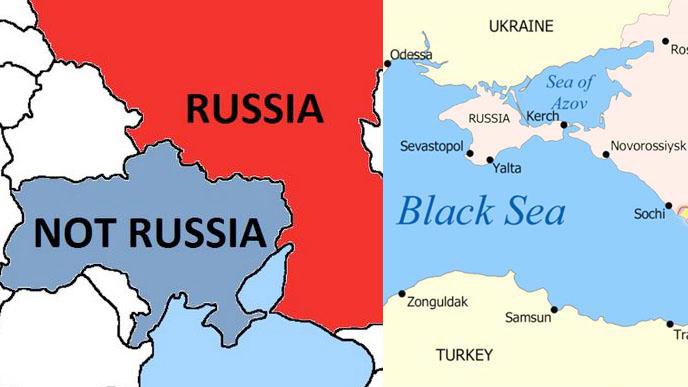Canada opens up a new front against Russia — Twitter snark
The maps that the Canada NATO Twitter account and Russia NATO Twitter account tweeted.
After hearing that Russian troops kept "accidentally" crossing the border into Ukraine, Canada — in typical Canadian spirit — wanted to lend a helping hand.
So on Thursday, the Canadian delegation to NATO tweeted a map as a "friendly" guide to help Russian soldiers make sure they're in the right place.
Not to be outdone, the Russian delegation responded with its own snarky map: One showing the Crimean peninsula, which Russia annexed earlier this year despite opposition from Western countries, as part of Russia.
The exchange attracted thousands of retweets and plenty of commentary online — and that's not all. Experts believe that these kinds of online engagements have actually affected how diplomacy works.
"I think we’ve seen a real change over the past decade in the way our traditional institutions — the institutions of diplomacy and institutions like NATO — communicate and engage," says Nicco Mele, a professor at Harvard's Kennedy School of Government and the author of “The End of Big: How The Internet Makes David The New Goliath.”
In the past, officials had to operate solely through formal channels and intermediaries. But today, Mele says, technology has made interactions more informal and personal.
“Ten years ago, it would be not just unthinkable but impossible for the [US] ambassador to the United Nations to have a gigantic online audience of the general public, as well as leaders and decision makers in multiple institutions,” he says.
Mele thinks that a back and forth on Twitter by world leaders can be a kind of entertainment, but also a forum for real communication. “These words carry weight and they impact relationships in a variety of ways,” he says.
He says he's even seen the impact in his Harvard classrooms. Mele says he now teaches his students that technology empowers individuals and challenges formal leadership, so the challenges of leadership are different than they used to be. “It’s much harder to have diplomacy and negotiations behind closed doors than it used to be,” he says.
But while the methods of communication have changed dramatically, Mele warns that regulations and norms have not kept up. "It's easy to think that Twitter is not a formal space for communication, but it can have unintended consequences," he says. "These words carry weight."
